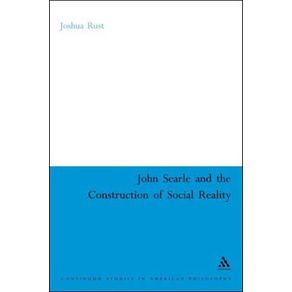John Searle (1932-) is one of the most famous living American philosophers. A pupil of J. L. Austin at Oxford in the 1950s, he is currently Mills Professor of the Philosophy of Mind and Language at the University of California, Berkeley. In 1995 John Searle published "The Construction of Social Reality", a text which not only promises to disclose the institutional backdrop against which speech takes place, but initiate a new 'philosophy of society'. Since then "The Construction of Social Reality" has been subject to a flurry of criticism. While many of Searle's interlocutors share the sense that the text marks an important breakthrough, he has time and again accused critics of misunderstanding his claims. Despite Searle's characteristic crispness and clarity there remains some confusion, among both philosophers and sociologists, regarding the significance of his proposals. This book traces some of the high points of this dialogue, leveraging Searle's own clarifications to propose a new way of understanding the text. In particular, Joshua Rust looks to Max Weber in suggesting that Searle has articulated an ideal type.



